Transmission Expansion Planning Using TLBO Algorithm in the Presence of Demand Response Resources
Abstract
:1. Introduction
- (1)
- Evaluation of the influence of an incentive-based DRP on TEP.
- (2)
- Developing TEP as a nonlinear function of the costs of losses, generation, and line construction.
- (3)
- Application of TLBO as a robust meta-heuristic algorithm for minimizing the TEP total costs.
2. Modelling the Demand Response Program
2.1. Elasticity in Demand Price
2.2. Modeling Single Period Elastic Loads
2.3. Modeling Multi-Period Elastic Loads
2.4. Economic Load Model
3. TLBO Algorithm
3.1. Teacher Step
3.2. Student Step
4. Transmission Expansion Planning Model
5. Study of the Network and Simulation Results
6. Conclusions
Author Contributions
Conflicts of Interest
References
- Garver, L.L. Transmission network estimation using linear programming. IEEE Trans. Power Appar. Syst. 1970, 89, 1688–1697. [Google Scholar] [CrossRef]
- Latorre-Bayona, G.; Perez-Arriaga, I.J. Chopin, a heuristic model for long term transmission expansion planning. IEEE Trans. Power Syst. 1994, 9, 1886–1894. [Google Scholar] [CrossRef]
- Mirhosseini, M.; Gharaveisi, A. Transmission network expansion planning with a heuristic approach. Int. J. Electron. Eng. 2010, 2, 235–237. [Google Scholar]
- Pereira, M.V.; Pinto, L.M. Application of sensitivity analysis of load supplying capability to interactive transmission expansion planning. IEEE Trans. Power Appar. Syst. 1985, 104, 381–389. [Google Scholar] [CrossRef]
- Sanchez, I.; Romero, R.; Mantovani, J.; Rider, M. Transmission-expansion planning using the dc model and nonlinear-programming technique. IEE Proc.-Gener. Transm. Distrib. 2005, 152, 763–769. [Google Scholar] [CrossRef]
- Monticelli, A.; Santos, A.; Pereira, M.; Cunha, S.; Parker, B.; Praca, J. Interactive transmission network planning using a least-effort criterion. IEEE Trans. Power Appar. Syst. 1982, 101, 3919–3925. [Google Scholar] [CrossRef]
- Sánchez, I.; Romero, R.; Mantovani, J.; Garcia, A. Interior point algorithm for linear programming used in transmission network synthesis. Electr. Power Syst. Res. 2005, 76, 9–16. [Google Scholar] [CrossRef]
- Romero, R.; Rocha, C.; Mantovani, J.; Sanchez, I. Constructive heuristic algorithm for the DC model in network transmission expansion planning. IEE Proc.-Gener. Transm. Distrib. 2005, 152, 277–282. [Google Scholar] [CrossRef]
- Rider, M.; Garcia, A.; Romero, R. Power system transmission network expansion planning using AC model. IET Gener. Transm. Distrib. 2007, 1, 731–742. [Google Scholar] [CrossRef]
- De Oliveira, E.J.; da Silva, I.; Pereira, J.L.R.; Carneiro, S. Transmission system expansion planning using a sigmoid function to handle integer investment variables. IEEE Trans. Power Syst. 2005, 20, 1616–1621. [Google Scholar] [CrossRef]
- Bennon, R.; Juves, J.; Meliopoulos, A. Use of sensitivity analysis in automated transmission planning. IEEE Trans. Power Appar. Syst. 1982, 101, 53–59. [Google Scholar] [CrossRef]
- Levi, V.; Ćalović, M. Linear-programming-based decomposition method for optimal planning of transmission network investments. IEE Proc. C Gener. Transm. Distrib. 1993, 140, 516–522. [Google Scholar] [CrossRef]
- Villasana, R.; Garver, L.; Salon, S. Transmission network planning using linear programming. IEEE Trans. Power Appar. Syst. 1985, 104, 349–356. [Google Scholar] [CrossRef]
- Al-Hamouz, Z.; Al-Faraj, A. Transmission expansion planning using nonlinear programming. In Proceedings of the Transmission and Distribution Conference and Exhibition 2002: Asia Pacific, Yokohama, Japan, 6–10 October 2002; pp. 50–55. [Google Scholar]
- Pereira, M.; Pinto, L.; Cunha, S.; Oliveira, G. A decomposition approach to automated generation/transmission expansion planning. IEEE Trans. Power Appar. Syst. 1985, 104, 3074–3083. [Google Scholar] [CrossRef]
- Munoz, F.D.; Hobbs, B.F.; Watson, J.-P. New bounding and decomposition approaches for milp investment problems: Multi-area transmission and generation planning under policy constraints. Eur. J. Oper. Res. 2016, 248, 888–898. [Google Scholar] [CrossRef]
- Falugi, P.; Konstantelos, I.; Strbac, G. Application of novel nested decomposition techniques to long-term planning problems. In Proceedings of the Power Systems Computation Conference (PSCC), Genoa, Italy, 20–24 June 2016; pp. 1–8. [Google Scholar]
- Jingdong, X.; Guoqing, T. The application of genetic algorithms in the multi-objective transmission network planning. In Proceedings of the Advances in Power System Control, Operation and Management forth International Conference, Hong Kong, China, 11–14 November 1997; pp. 338–341. [Google Scholar]
- Da Silva, E.L.; Gil, H.A.; Areiza, J.M. Transmission network expansion planning under an improved genetic algorithm. In Proceedings of the 21st 1999 IEEE International Conference on Power Industry Computer Applications, Santa Clara, CA, USA, 21 May 1999; pp. 315–321. [Google Scholar]
- Yoshimoto, K.; Yasuda, K.; Yokoyama, R. Transmission expansion planning using neuro-computing hybridized with genetic algorithm. In Proceedings of the IEEE International Conference on Evolutionary Computation, Perth, Australia, 29 November–1 December 1995; p. 126. [Google Scholar]
- Gallego, R.; Alves, A.; Monticelli, A.; Romero, R. Parallel simulated annealing applied to long term transmission network expansion planning. IEEE Trans. Power Syst. 1997, 12, 181–188. [Google Scholar] [CrossRef]
- Wen, F.; Chang, C. Transmission network optimal planning using the tabu search method. Electr. Power Syst. Res. 1997, 42, 153–163. [Google Scholar] [CrossRef]
- Binato, S.; de Oliveira, G.C.; de Araújo, J.L. A greedy randomized adaptive search procedure for transmission expansion planning. IEEE Trans. Power Syst. 2001, 16, 247–253. [Google Scholar] [CrossRef]
- Maghouli, P.; Hosseini, S.H.; Buygi, M.O.; Shahidehpour, M. A scenario-based multi-objective model for multi-stage transmission expansion planning. IEEE Trans. Power Syst. 2011, 26, 470–478. [Google Scholar] [CrossRef]
- Maghouli, P.; Hosseini, S.H.; Buygi, M.O.; Shahidehpour, M. A multi-objective framework for transmission expansion planning in deregulated environments. IEEE Trans. Power Syst. 2009, 24, 1051–1061. [Google Scholar] [CrossRef]
- Khodaei, A.; Shahidehpour, M.; Wu, L.; Li, Z. Coordination of short-term operation constraints in multi-area expansion planning. IEEE Trans. Power Syst. 2012, 27, 2242–2250. [Google Scholar] [CrossRef]
- Kazerooni, A.; Mutale, J. Transmission network planning under a price-based demand response program. In Proceedings of the 2010 IEE/PES Transmission and Distribution Conference and Exposition, New Orleans, LA, USA, 19–22 April 2010; pp. 19–22. [Google Scholar]
- Kazerooni, A.; Mutale, J. Network investment planning for high penetration of wind energy under demand response program. In Proceedings of the 2010 IEEE 11th Conference on Probabilistic Methods Applied to Power Systems (PMAPS), Singapore, 14–17 June 2010; pp. 238–243. [Google Scholar]
- Özdemir, Ö.; Munoz, F.D.; Ho, J.L.; Hobbs, B.F. Economic analysis of transmission expansion planning with price-responsive demand and quadratic losses by successive LP. IEEE Trans. Power Syst. 2016, 31, 1096–1107. [Google Scholar] [CrossRef]
- Konstantelos, I.; Strbac, G. Valuation of flexible transmission investment options under uncertainty. IEEE Trans. Power Syst. 2015, 30, 1047–1055. [Google Scholar] [CrossRef]
- Aalami, H.; Moghaddam, M.P.; Yousefi, G. Modeling and prioritizing demand response programs in power markets. Electr. Power Syst. Res. 2010, 80, 426–435. [Google Scholar] [CrossRef]
- Kirschen, D.S.; Strbac, G. Fundamentals of Power System Economics; John Wiley & Sons: Hoboken, NJ, USA, 2004. [Google Scholar]
- Buygi, M.O.; Shanechi, H.M.; Balzer, G.; Shahidehpour, M. Transmission planning approaches in restructured power systems. In Proceedings of the 2003 IEEE Bologna Power Tech Conference Proceedings, Bologna, Italy, 23–26 June 2003. [Google Scholar]
- Moghaddam, M.P.; Abdollahi, A.; Rashidinejad, M. Flexible demand response programs modeling in competitive electricity markets. Appl. Energy 2011, 88, 3257–3269. [Google Scholar] [CrossRef]
- Rao, R.V.; Savsani, V.J.; Vakharia, D. Teaching–learning-based optimization: A novel method for constrained mechanical design optimization problems. Comput.-Aided Des. 2011, 43, 303–315. [Google Scholar] [CrossRef]
- Jin, Y.-X.; Cheng, H.-Z.; Yan, J.-Y.; Zhang, L. New discrete method for particle swarm optimization and its application in transmission network expansion planning. Electr. Power Syst. Res. 2007, 77, 227–233. [Google Scholar] [CrossRef]
- Wood, A.J.; Wollenberg, B.F. Power Generation, Operation, and Control; John Wiley & Sons: Hoboken, NJ, USA, 2012. [Google Scholar]
- Li, Z.; Ding, R.; Floudas, C.A. A comparative theoretical and computational study on robust counterpart optimization: I. Robust linear optimization and robust mixed integer linear optimization. Ind. Eng. Chem. Res. 2011, 50, 10567–10603. [Google Scholar] [CrossRef] [PubMed]
- IEEE 57-Bus System. Available online: Http://icseg.Iti.Illinois.Edu/ieee-57-bus-system/ (accessed on 25 November 1973).
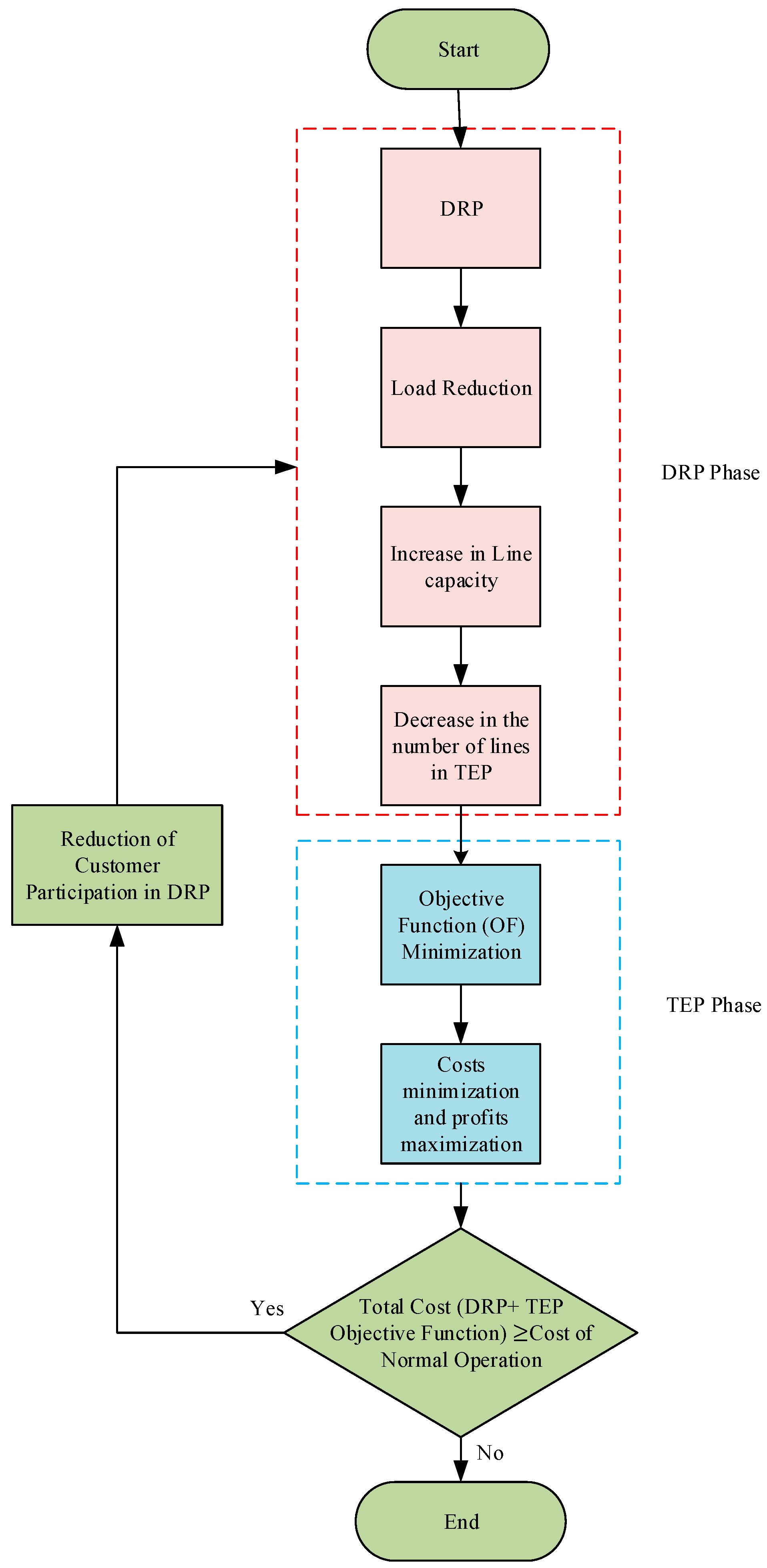
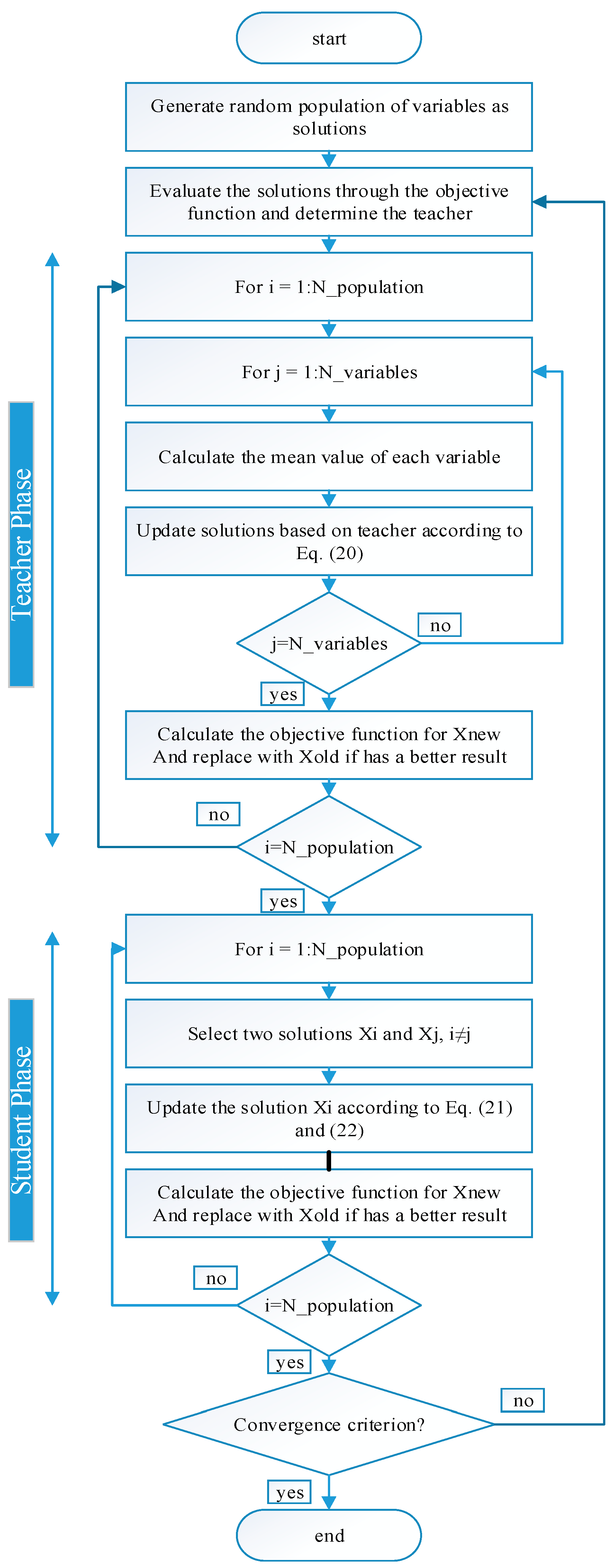
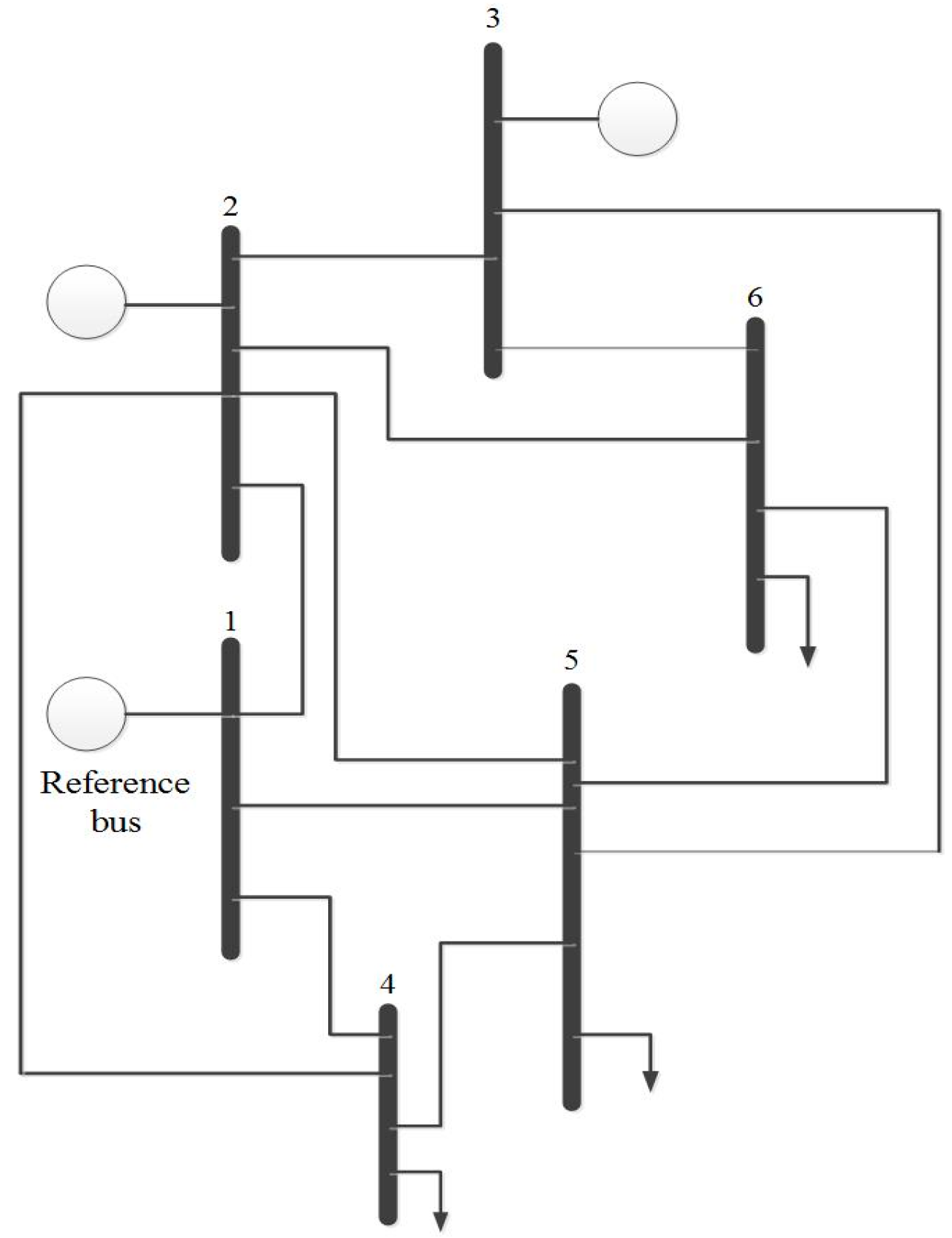


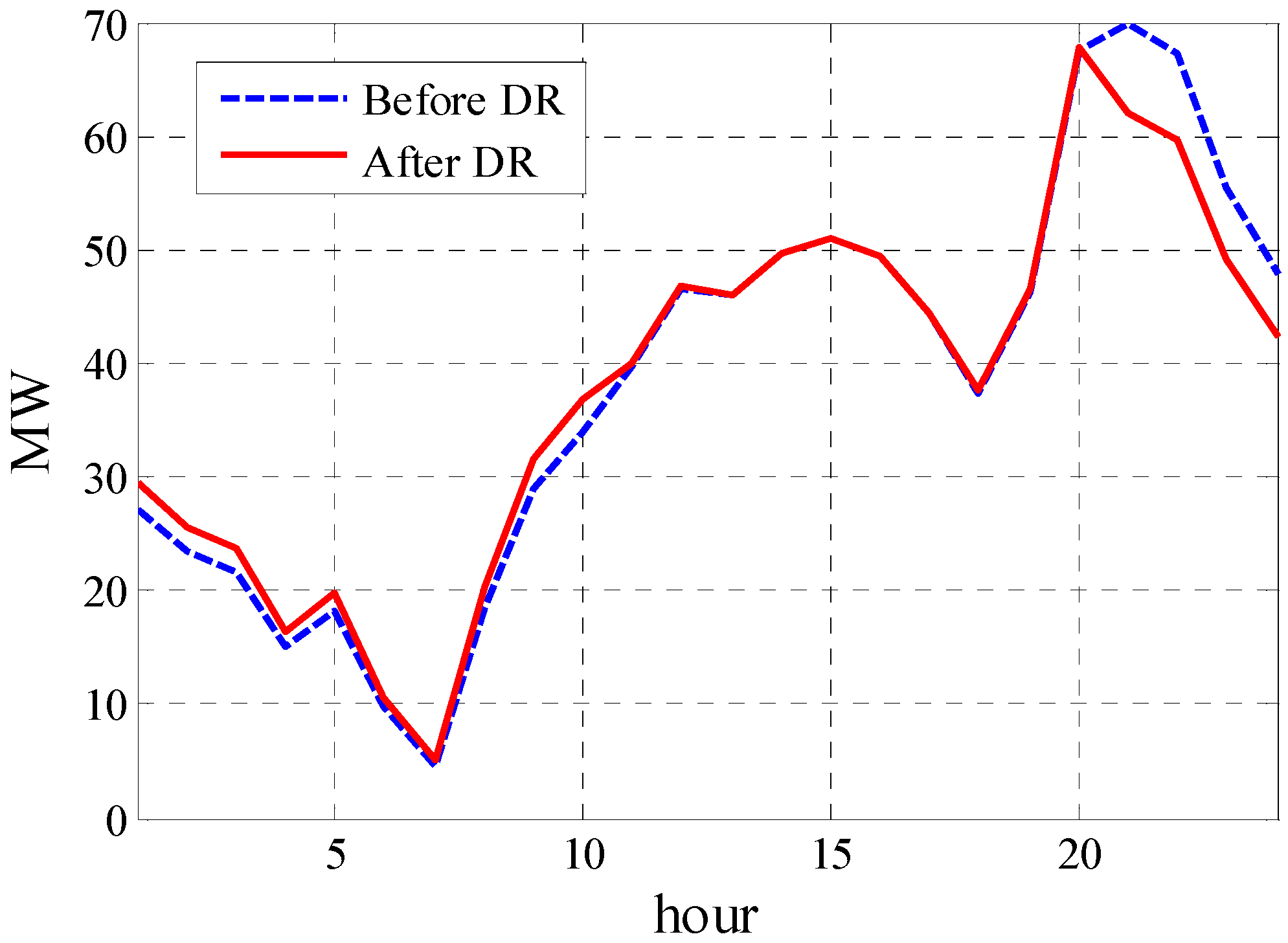
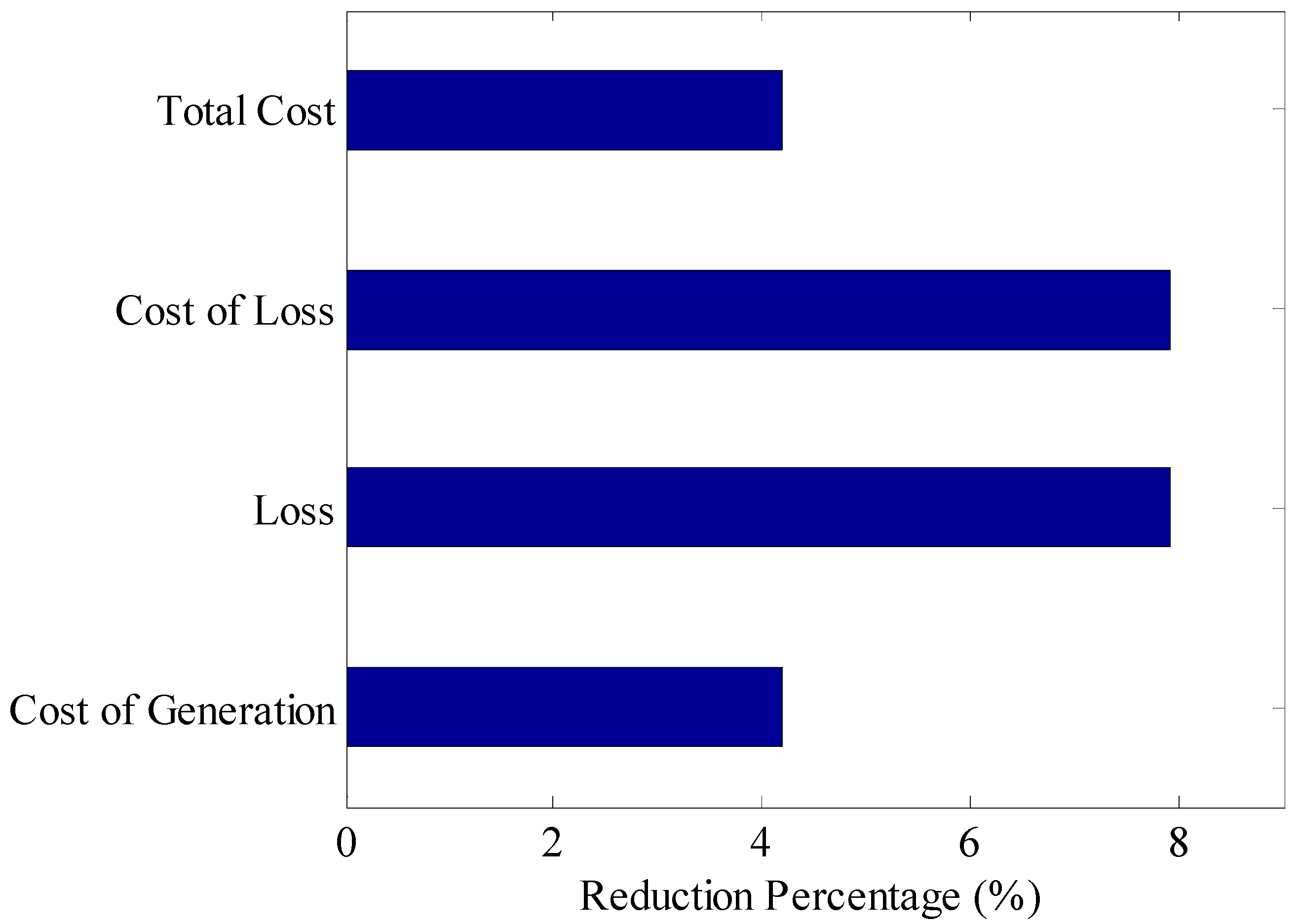

| Peak | Off-Peak | Valley | |
|---|---|---|---|
| Peak | −0.10 | 0.016 | 0.012 |
| Off-Peak | 0.016 | −0.10 | 0.01 |
| Valley | 0.012 | 0.01 | −0.10 |
| Scenario | Loss (MW) | Cost of Loss ($/h) | Cost of Generation ($/h) | Cost of Line ($/h) | Total Cost ($/h) |
|---|---|---|---|---|---|
| Before DR | 6.908 | 24.04 | 3143.97 | 63.627 | 3231.637 |
| After DR | 6.361 | 22.14 | 3010.87 | 63.627 | 3096.637 |
| Scenario | No. of Lines Added Between Two Different Buses | Loss (MW) | Cost of Loss ($/h) | Cost of Generation ($/h) | Cost of Line Construction ($/h) | Cost of DR (S/h) | Total Cost ($/h) |
|---|---|---|---|---|---|---|---|
| 3 | 1–2(3), 1–3(3), 1–4(0), 1–5(3), 1–6(3), 2–3(3), 2–4(0), 2–5(3), 2–6(3), 3–4(3), 3–5(3), 3–6(3), 4–5(3), 4–6(2), 5–6(3) | 1093 | 3.60 | 1868.63 | 108.37 | 670.96 | 2651.56 |
| 4 | 1–2(3), 1–3(0), 1–4(0), 1–5(0), 1–6(0), 2–3(3), 2–4(0), 2–5(0), 2–6(0), 3–4(0), 3–5(0), 3–6(0), 4–5(0), 4–6(0), 5–6(0) | 2.93 | 10.21 | 1868.63 | 68.22 | 670.96 | 2618.02 |
| Scenario | No. of Lines Added Between Two Different Buses | Loss (MW) | Cost of Loss ($/h) | Cost of Generation ($/h) | Cost of Line Construction ($/h) | Cost of DR (S/h) | Total Cost ($/h) |
|---|---|---|---|---|---|---|---|
| 3 | 1–2(0), 1–3(3), 1–6(3), 1–8(3), 1–9(3), 1–12(3), 1–16(3), 1–17(3), 2–3(3), 2–6(3), 2–8(3), 2–9(3), 2–12(3), 2–16(3), 2–17(3), 3–6(3), 3–8(3), 3–9(3), 3–12(2), 3–16(0), 3–17(0), 6–8(3), 6–9(3), 6–12(3), 6–16(0), 6–17(0), 8–9(3), 8–12(3), 8–16(3), 8–17(3), 9–12(2), 9–16(3), 9–17(0), 12–16(2), 12–17(3), 16–17(0) | 9.79 | 34.09 | 40,309 | 577.14 | 900 | 41,790 |
| 4 | 1–2(0), 1–3(0), 1–6(0), 1–8(3), 1–9(3), 1–12(3), 1–16(3), 1–17(0), 2–3(3), 2–6(0), 2–8(3), 2–9(3), 2–12(3), 2–16(3), 2–17(0), 3–6(0), 3–8(0), 3–9(0), 3–12(0), 3–16(0), 3–17(0), 6–8(3), 6–9(0), 6–12(0), 6–16(0), 6–17(3), 8–9(3), 8–12(3), 8–16(3), 8–17(3), 9–12(0), 9–16(3), 9–17(0), 12–16(3), 12–17(3), 16–17(0) | 10.38 | 36.12 | 40,335 | 536 | 900 | 41,777 |
© 2017 by the authors. Licensee MDPI, Basel, Switzerland. This article is an open access article distributed under the terms and conditions of the Creative Commons Attribution (CC BY) license (http://creativecommons.org/licenses/by/4.0/).
Share and Cite
Zakeri, A.S.; Askarian Abyaneh, H. Transmission Expansion Planning Using TLBO Algorithm in the Presence of Demand Response Resources. Energies 2017, 10, 1376. https://doi.org/10.3390/en10091376
Zakeri AS, Askarian Abyaneh H. Transmission Expansion Planning Using TLBO Algorithm in the Presence of Demand Response Resources. Energies. 2017; 10(9):1376. https://doi.org/10.3390/en10091376
Chicago/Turabian StyleZakeri, Amir Sadegh, and Hossein Askarian Abyaneh. 2017. "Transmission Expansion Planning Using TLBO Algorithm in the Presence of Demand Response Resources" Energies 10, no. 9: 1376. https://doi.org/10.3390/en10091376




